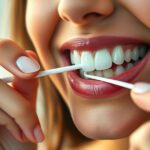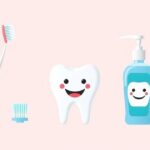Dealing with dental plaque can be frustrating, especially when traditional methods feel insufficient. If you’re one of the many women over 30 seeking more natural solutions to oral health, you’re not alone. Many face challenges such as sensitivity, increased dental visits, and concerns about long-term health. This article shares effective, natural ways to remove plaque at home, helping you reclaim your dental confidence and enhance your well-being.
Understanding Dental Plaque: What You Need to Know
Dental plaque is a sticky, colorless film of bacteria that forms on your teeth. It can build up throughout the day, especially after eating. When we consume sugary or starchy foods, the bacteria in plaque produce acids that can erode tooth enamel and lead to cavities.
It’s important to understand how plaque develops. The process begins with the bacteria in our mouths. These bacteria form a biofilm, using food particles to thrive. If plaque is not removed regularly, it can harden into tartar, which needs professional cleaning.
Regular brushing and flossing can help combat plaque, but many people are looking for natural solutions to support their oral health.
Benefits of Natural Remedies for Oral Health
Using natural remedies to maintain oral hygiene can provide numerous benefits:
- Safety: Natural ingredients are typically less harsh than commercial products.
- Avoiding Chemicals: Many traditional dental products contain artificial additives and preservatives that some people prefer to avoid.
- Cost-Effective: Natural ingredients can often be found in your pantry, saving you money.
- Holistic Health: Focusing on natural oral health can improve not just your teeth, but overall health.
Embracing natural remedies may help foster a sense of empowerment in your dental hygiene routine.
Simple Foods That Help Remove Plaque
Incorporating certain foods into your diet can boost your efforts to keep plaque at bay:
- Crunchy Fruits and Vegetables: Apples, carrots, and celery can help scrub your teeth naturally as you chew.
- Cheese: Dairy products can neutralize acids in the mouth and provide calcium for stronger teeth.
- Green Tea: This beverage contains polyphenols that can inhibit the growth of bacteria that cause plaque.
- Raw Onion: The sulfur compounds in onions have antibacterial properties that can help fight plaque.
Making these foods a regular part of your meals can contribute to a healthier mouth.
Herbal Rinses to Combat Plaque Buildup
You can create your own herbal mouth rinses to help reduce plaque:
- Mint Mouthwash: Steep fresh mint leaves in hot water, cool, and use as a mouth rinse to freshen breath.
- Salt Water Rinse: A mix of warm water and salt can help kill bacteria and soothe inflamed gums.
- Clove Oil Rinse: Dilute clove oil in water for its natural antibacterial properties.
These herbal rinses are not only soothing but can also promote a healthier mouth.
Oil Pulling: A Traditional Method for Dental Care
Oil pulling is an ancient practice that involves swishing oil in your mouth for several minutes. This method is believed to draw out toxins and bacteria:
- Sesame Oil: Known for its antibacterial properties, it can be a suitable choice.
- Coconut Oil: With its natural antimicrobial benefits, coconut oil is a popular option.
To perform oil pulling, simply take a tablespoon of oil, swish it around your mouth for 10–20 minutes, then spit it out and rinse your mouth. Consider incorporating this into your routine on mornings when you need a little extra oral care.
Brushing Techniques to Effectively Remove Plaque
Adopting the right brushing technique is crucial in the fight against plaque:
- Angle: Hold your toothbrush at a 45-degree angle to your gums.
- Gentle Pressure: Use gentle pressure and circular motions to clean the surface of your teeth.
- Frequency: Brush at least twice daily for two minutes each time.
Don’t forget to brush your tongue as well, as bacteria can accumulate there too!
The Role of Hydration in Dental Health
Staying hydrated is important for your oral health:
- Saliva Production: Water helps produce saliva, which is essential for neutralizing acids and washing away food particles.
- Flushing Out Toxins: Drinking water can aid in flushing out bacteria and other harmful substances from your mouth.
Make it a habit to carry a water bottle throughout the day. Not only will it keep you hydrated, but it also helps your mouth stay clean and fresh.
Incorporating Probiotics for a Healthier Mouth
Probiotics are beneficial bacteria that can help maintain balance in your mouth:
- Yogurt: Eating yogurt with live cultures can boost healthy bacteria levels.
- Probiotic Supplements: Consider taking supplements specifically designed for oral health.
These additions to your diet can reduce harmful bacteria that contribute to plaque formation and promote a healthier mouth overall.
Lifestyle Changes that Support Oral Hygiene
Making broader lifestyle changes can also contribute to better oral health:
- Quit Smoking: Tobacco products contribute to plaque buildup and gum disease.
- Limit Sugar Intake: Reducing sugary foods can decrease plaque-forming bacteria.
- Regular Dental Visits: Don’t forget to schedule check-ups and cleanings with your dentist.
These changes can have a positive impact on your overall health, reinforcing your commitment to maintaining a bright and healthy smile.
Empower Yourself: Steps to Maintain a Plaque-Free Smile
To keep your smile bright and healthy, consider the following steps:
- Create a Routine: Establish a daily oral hygiene routine that includes brushing, flossing, and rinsing.
- Be Consistent: Consistency is key. Stick to your routine even on busy days.
- Educate Yourself: Stay informed about good oral hygiene practices.
Taking control of your oral health can empower you to achieve a radiant smile and improved confidence.






